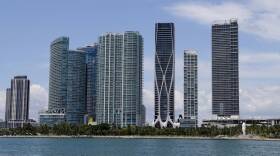-
A new report by scientists from four major Florida universities, says that the wildlife corridor — if completed — will not only allow wildlife to survive in the coming decades, it will make climate change less destructive to humans.
-
Florida may be “ground zero” for climate change, but some environmentalists see the DeSantis administration’s rejection of the money as a partisan move.
-
Dr. Daniel Wildcat suggests the approach of Native peoples offers some viable alternatives to Western European methodologies.
-
About 10,000 single-family households in the state will receive financial help installing rooftop solar. Low-income households could be subsidized 80% to 100%, and those with moderate income 60% to 80%.
-
Their proposal comes amid continued interest in expanding oil production within the Big Cypress National Preserve, an Everglades wilderness they consider sacred.
-
Carbon capture pilot project is coming to Hillsborough, despite pushback from clean energy advocatesFor 60 days, a company plans to capture one ton of carbon dioxide daily from the county's waste-to-energy plant, which produces 600 tons of carbon dioxide a day.
-
Shorelock is biopolymer that enhances the interaction of sand particles with water to resist erosion, provide a more stable coastline.
-
Burmese pythons are hunted and euthanized in the Florida Everglades due to being an invasive species. Some countries farm python to eat and Australian researchers say its the best meat for the planet.
-
Wetlands have generally kept pace with sea-level rise by building upward and creeping inland a few meters per year. But raised roadbeds, cities, farms and increasing land elevation can leave wetlands with nowhere to go.
-
A farmworker, advocate and member of the medical community weigh in on Gov. Ron DeSantis signing a bill that will prohibit local governments enacting laws to protect outdoor workers from extreme heat.
-
New research published in the journal Nature showed the potential risk of a one-two combo of sinking land and rising seas to cities along the coast, and Miami topped the list as a location that could see quite a bit of flooded property by mid-century.
-
Emails show the office of Gov. Ron DeSantis suggested wording that would have banned all wind energy in the state.
Play Live Radio
Next Up:
0:00
0:00
Available On Air Stations












